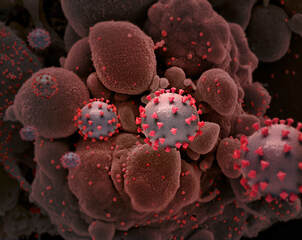Laurie Anne Walden, DVM Creative rendition of SARS-CoV-2 virus particles, National Institute of Allergy and Infectious Diseases, NIH. Public domain. Creative rendition of SARS-CoV-2 virus particles, National Institute of Allergy and Infectious Diseases, NIH. Public domain. As COVID-19 cases increase, more pets are exposed to the virus, so it’s time to review what we know about COVID-19 and animals. The content of this article is current as of February 7, 2022. Can animals get COVID-19? A number of mammal species, including dogs and cats, can be infected with SARS-CoV-2 (the virus that causes COVID-19). Infection in animals is rare compared with infection in people. Most animals infected with the virus have had close contact with people who had COVID-19. Some species have been experimentally infected under controlled conditions; these species might or might not be able to get infected naturally. The virus has not been found in birds, reptiles, amphibians, or fish. Animals infected with SARS-CoV-2 don’t necessarily get sick. Domestic cats, large cats, dogs, ferrets, hamsters, mink, and gorillas have developed symptoms after being infected. Infection with no symptoms has been found in rabbits, bats, white-tailed deer, and many other species. Symptoms of SARS-CoV-2 infection in animals are usually mild and nonspecific (lots of other things cause the same symptoms):
Can pets spread COVID-19 to people or other animals? The risk of catching COVID-19 from a pet is very low. There is no evidence that animals are a significant source of infection for people or that animals carry the virus on their fur. An exception is that SARS-CoV-2 was found to spread in both directions between mink and humans on mink farms in Denmark. Some animals can infect other animals of the same species. For example, SARS-CoV-2 spreads among white-tailed deer populations without causing symptoms. Someone in my household has COVID-19. How should I protect my pets? People with COVID-19 can spread the virus to dogs, cats, and ferrets, although serious illness is rare in animals. The CDC recommends that people with COVID-19 avoid close contact with pets, stay in a room away from pets as much as possible, and wear a mask if they need to be near pets. People carrying the infection should also wash their hands before and after handling animals, avoid sharing food with animals, and avoid kissing their pets or letting their pets lick them in the face. There is no reason to remove pets from the home unless their caregiver is unable to take care of them. Don’t put a mask on an animal or do anything else that might block its airflow. Increase ventilation or use air filters instead. Don’t use hand sanitizer, disinfecting wipes, or surface cleaners on an animal. I think my pet might have COVID-19. What should I do? If your pet has symptoms that seem similar to COVID-19, call your veterinarian. If you have COVID-19, don’t take your pet to the clinic yourself. Your veterinarian will advise you on whether your pet should be seen at the clinic. Can I have my pet tested for COVID-19? Don’t use a home test on an animal. Routine animal testing for COVID-19 is not currently recommended because infection is rare in animals, the symptoms are more likely to be caused by something else, and animals aren’t a significant source of SARS-CoV-2 infection in humans. Decisions about animal testing are made by a veterinarian in consultation with public health officials. A veterinarian will need to rule out more common causes of the symptoms before considering SARS-CoV-2 testing. Testing might be done for animals that meet criteria like having exposure to an infected person and having symptoms compatible with SARS-CoV-2 infection (with no other cause found). Can my pet be vaccinated for COVID-19? Vaccines for dogs and cats are not available. According to the World Organisation for Animal Health, vaccines are being developed for some animal species that are susceptible to SARS-CoV-2 infection. An experimental COVID-19 vaccine has been given to zoo animals at risk of getting sick from the infection. Mink will likely also be a priority species for vaccine development because of their potential to spread the infection to humans. Please see these sources for updates and more information:
Public domain image credit: National Institute of Allergy and Infectious Diseases, NIH. Source: NIH Image Gallery Comments are closed.
|
AuthorLaurie Anne Walden, DVM Categories
All
Archives
June 2024
The contents of this blog are for information only and should not substitute for advice from a veterinarian who has examined the animal. All blog content is copyrighted by Mallard Creek Animal Hospital and may not be copied, reproduced, transmitted, or distributed without permission.
|
- Home
- About
- Our Services
- Our Team
-
Client Education Center
- AKC: Spaying and Neutering your Puppy
- Animal Poison Control
- ASPCA Poisonous Plants
- AVMA: Spaying and Neutering your pet
- Biting Puppies
- Boarding Your Dog
- Caring for the Senior Cat
- Cats and Claws
- FDA warning - Bone treats
- Force Free Alliance of Charlotte Trainers
- Getting your Cat to the Vet - AAFP
- Holiday Hazards
- How To Feed Cats for Good Health
- How to Get the Most Out of your Annual Exam
- Indoor Cat Initiative - OSU
- Introducing Your Dog to Your Baby
- Moving Your Cat to a New Home
- Muzzle Training
- Osteoarthritis Checklist for Cats
- What To Do When You Find a Stray
- Our Online Store
- Dr. Walden's Blog
- Client Center
- Contact
- Cat Enrichment Month 2024
|
Office Hours
Monday through Friday 7:30 am to 6:00 pm
|
Mallard Creek Animal Hospital
2110 Ben Craig Dr. Suite 100
|
Site powered by Weebly. Managed by IDEXX Laboratories

 RSS Feed
RSS Feed